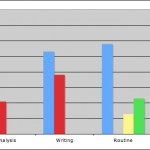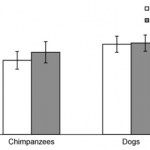
Do cats have self recognition? This video suggests they might not, at least in terms of passing the mirror recognition task. But, well, this isn't really the mirror recognition task. And the mirror recognition task may not be the best way to test self recognition in cats.
But in any case, it's a pretty hilarious video of an (evil) cat.
(via @ferrisjabr)
You can have a pet domesticated fox of your very own - from the Russian fox farm I've previously written about - for the low low price of just $5,950.
Figure 1: Isn't he cute? Click to embiggen.
Check it out.
According to the website,
Housing:
Foxes can live outside or inside.They need shade from excessive heat and rain. A bed or blanket is nice, but optional.
If the fox lives outside, the cage should have a bottom or the walls of the cage should be dug in deep enough so that the fox cannot dig a hole and escape.
Inside your house, they will snuggle on a bed like a cat.
During the…
Last week, I asked on twitter, and then on the blog, about peoples' preferences for listening to music while doing various types of sciencey work, and conducted an informal survey.
Today I'll give you the (entirely unscientific) results, and in a few days I'll share what research has to say about music and work productivity.
Fifty three scientists (or scientists-in-training) completed the survey. I had predicted that music would be preferred in general, but that as language demands of the task increased, music preference overall would decrease. Since I'm doing this at home and don't have SPSS…
The awesome videos just keep on coming. Check out this one from National Geographic.
A juvenile chimp and her mother set out to do some fishing for termites in Congo's Goualougo Triangle, but the juvenile spots something interesting - an apparently not-so-well hidden camera - and investigates. I think it's so fascinating to see how the chimp approaches and investigates a new object. First by visually examining it, then by poking with a stick, and then by feeling it with her hand. Unfortunately, I can't embed it here, so go check it out on the Nat Geo site!
Well, sort of. Ready for the new SETI blog here at Scienceblogs? They launched today.
I don't know if we have to look to the skies to find aliens. We've got some pretty strange terrestrial life around here:
(via @sfriedscientist of Southern Fried Science)
This is just cool. No behavior, no cognition, no neuroscience. Just animal awesomeness.
Amazing time-lapse video of a twelve-foot spider crab molting. Watch til the end.
From Neatorama, via @kzelnio (of Deep Sea News)
Lots of new things to tell you about.
First, SB has reinvigorated the ScienceBlogs Book Club. The first book being discussed is "Inside the Outbreaks: The Elite Medical Detectives of the Epidemic Intelligence Service" by Mark Pendergrast, who is participating in the book club himself, and already has a post up.
Second, exciting news from SB headquarters:
We here at ScienceBlogs are pleased to announce that beginning today, we will be helping to spark the next generation of research communications by introducing new blogs to our network from the world's top scientific institutions. The…
Here at my Research Blogging Editor's Selections for this week:
A few hours late, but full of psychological and neurosciencey goodness as always!
Bill Yates of Brain Posts asks, Can An iPhone Save Your Life?
A topic near and dear to my own heart: Do we learn through experience to navigate the world, or as the philosopher Immanuel Kant suggested, are we born with innate mental "building blocks" for things like space and time? Neuroskeptic reviews two new interesting papers which found support for the Kantian model.
Another recent paper suggested that the crayfish might be a good model for…
Happy Father's Day, everyone!
I spent a lot of time today thinking back to why I started blogging in the first place, while I was at my parents house doing the other-than-science things that I love to do: playing with the dog, cooking, gardening. I realized that I've not done enough of that stuff lately.
I've only been seriously doing the blog thing (in the current format) since January, and I've now been here at Scienceblogs around two months, so it was time to reflect. The transition from Wordpress obscurity to Scienceblogs prominence happened relatively quickly for me, and I think it's a…
I've been watching with interest a recent kerfuffle involving a relatively new blog in the sciblogosphere, Academic Jungle, which is written by the pseudonymous blogger GeekMommyProf.
Prof-Like Substance has already written a good summary of recent events, so I won't duplicate his efforts. Instead, I'll duplicate his text! (Bracketed bold text inserted by me):
GeekMommyProf started a blog about a month ago, which burst onto the scene in a hurry. Most blogs (including this one) toil in obscurity for a while, eventually gain some steam and get enough readers coming back to get talked about a…
Figure 1: Another gem from the good folks at Fake Science.
Here is this week's round-up of particularly awesome reading material:
Reflections on the Gulf Oil Spill. Want to know why BP (and, well, the entire gulf coast cleanup effort) is doing it wrong? Christie Wilcox has an awesome post. This is a must read. Also, my friends at Southern Fried Science have put together a list of blogs and tweeps to check out for oil spill coverage of the highest quality.
Also, via Southern Fried Science: why marine mammals aren't so cute and cuddly. How did I miss this in April when it was published?
Do you…
Once upon a Thursday night, blog bff Scicurious asked a particular blogger named Jason if he had access to a paper titled, Contraceptive efficacy of polyester-induced azoospermia in normal men. "I certainly hope so," he said. And so he logged in to his university's library proxy website, and searched for the paper.
She said, "PLEASE PLEASE PLEASE tell me you have access to this article" and then "it's about ball sacks I MUST HAVE IT." As it happens, he did have institutional access. So Jason downloaded it. It was a rather large file, so it took a little while for him to upload it to his Gmail…
This video has been winding its way through the interwebs. It's pretty neat, but is it truly a case of tortoise altruism? Who knows. We don't know anything about those specific turtles or that specific situation. We don't know if they're kin, we don't know if they're trained, if they're pets or wild, we don't know what happened before the camera was turned on, or after it was turned off.
Even still, it's pretty cool.
I'm interested in finding out what are peoples' music listening habits while working on various sciencey things. After a small survey and discussion on twitter, I thought I'd bring it to the blogosphere, as people seem to generally have opinions on the matter.
This is going to be far from scientific, but take the below survey, and I'll be back later with the results, as well as some data and thoughts based on the scientific literature.
Also, you can complete the survey even if not all questions apply to you. For example, if you are not a current or former research scientist, but are, for…
Another awesome music video from OK Go. The song is called "End Love". Their last video for "This Too Shall Pass" featured a Rube-Goldberg machine; this one messes with your time perception.
"The fastest we go is 172,800x, compressing 24 hours of real time into a blazing 1/2 second. The slowest is 1/32x speed, stretching a mere 1/2 second of real time into a whopping 16 seconds. This gives us a fastest to slowest ratio of 5.5 million. If you like averages, the average speed up factor of the band dancing is 270x. In total we shot 18 hours of the band dancing and 192 hours of LA skyline…
Dogs are particularly good at tasks that involve communicating or cooperating with humans, which has led some researchers to speculate that they are really good at solving social tasks, more generally. For example, dogs can figure out where a human's attention is, are really good at picking up on eye-gaze and finger pointing cues, distinguish among different individual humans (by contrast, humans are really bad at distinguishing among different individual monkeys, for example), and at least in one outstanding case, are capable of "fast mapping."
Relative to non-human primates, domestic dogs…
Here are my Research Blogging Editor's Selections for this week.
To start things off, two of ResearchBlogging's Editors did a joint blogcast this week. Listen to Travis and I discuss the relative benefits of using self-report data. Check out Travis's take on our conversation, and mine.
The Lies That Data Tell. Richard N. Landers describes an important new paper from the journal Psychological Science about how tests of statistical significance can mislead us.
The Plastic Brains of Birds. NeuroKuz reviews some recent research in the neurobiology of learning in songbirds, and its implications…
If you're a regular reader of Peter and Travis's blog, Obesity Panacea, you may have heard one of their semi-regular blogcasts. Well, since Peter is traveling the world (read about it here), Travis asked me to join him for a blogcast. While discussing topics that we could discuss, a sent a few links and papers his way, and he was like "ugh, self-report." And I was like, "dude, self-report makes the world go around."
Okay, so the conversation may not have gone exactly like that, but the outcome was we decided to go ahead and talk about the relative merits of self-report data in science.
As he…
I've decided I want to cover some recent research on social cognition in domesticated dogs. But first, we need some background. So here's a repost from the old blog.
Today I want to tell you about one of my most favorite studies, ever, of animals. Are you ready? It's a FIFTY YEAR LONG longitudinal study of captive silver foxes in Russia. Gather around, pour yourself a cup of your favorite beverage, get comfortable, and enjoy storytime.
In 1948, Soviet scientist Dmitri Belyaev lost his job at the Department of Fur Animal Breeding at the Central Research Laboratory of Fur Breeding in Moscow…






